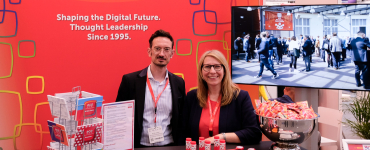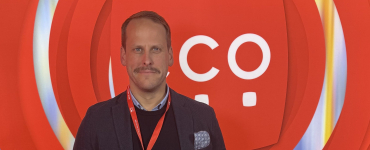- Vosshenrich, could you give us a brief introduction to your company in 2-3 sentences?
With pleasure. We contribute to the digitalisation of “bricks-and-mortar” stationary retail trade. To be more specific: we equip the shelves with digital solutions to make all stock movements trackable. When a customer removes an item from the shelf, our service pushes the remaining items to the front and registers how many items have been removed and are still there. In order to do this, we have equipped the product feeds of our parent company POS Tuning with sensors and bluetooth that transmit information via the Internet of Things (IoT) to the cloud. This wealth of information helps to improve processes in the outlets, such as automating timely reordering.
- Which digitalisation topics are particularly important to you?
When it comes to digitalisation, bricks-and-mortar retailers have some catching up to do in the area of online retail. For example, the customer journey online is easily trackable, showing everything that a customer does before putting an item in the shopping basket and paying. We also want to give stationary retailers the advantage of this information. With our solutions, retailers know when a customer takes something off the shelf and puts it in the shopping basket or trolley. The Internet of Things (IoT) is currently revolutionising supply chains in retail. With our system, retailers benefit from this on location.
- What are the special challenges in your branch currently, and how are you working on them?
In practical terms, we digitalise the products on the shelf on location and thus help to make the processes on the premises more economical. To survive economically against online competition is a real challenge for retailers. The costs for space in central locations are usually higher.
- How do you expect your membership of the eco Association to support you here?
In order to derive recommendations for action and process improvements for retailers, we collect data with sensors, transmit it via IoT, and analyse it in the cloud. This means that we work together with numerous Internet companies that are also eco members. In addition, data protection issues arise for us. With the know-how of the companies in the eco Association, we want to improve our services, make sure that they’re legally compliant, and establish new operating and revenue models.
- What opportunities does digitalisation offer us for the future?
Retail on location is getting better and better with digital solutions. Keywords here are automated pricing or automated reordering. The bottom line is that retailers save on processing costs and returns, and less food has to be thrown away. Digitalisation gives on-location retailers the chance to spend less time on standard administrative processes. Instead, they have more time for the people on site.
Thank you very much for the interview!
Oliver Vosshenrich, born in 1973, studied computer science and business administration in Paderborn, Germany. While still a student, he founded his first company and developed web-based systems for large, internationally active companies, including Volkswagen and Bertelsmann. Since 2005, Oliver Vosshenrich has been a partner and managing director of POS Tuning. With around 200 employees, the company ensures that shoppers in over 120 countries always find their favourite products in the best possible spectrum. As a certified category manager and board member of the German Shopfitting Association, he knows the processes in retail through and through. In November 2019, with the goal of revolutionising stationary retail through the Internet of Things, Oliver Vosshenrich founded neoalto GmbH alongside Rene Bredlau.




